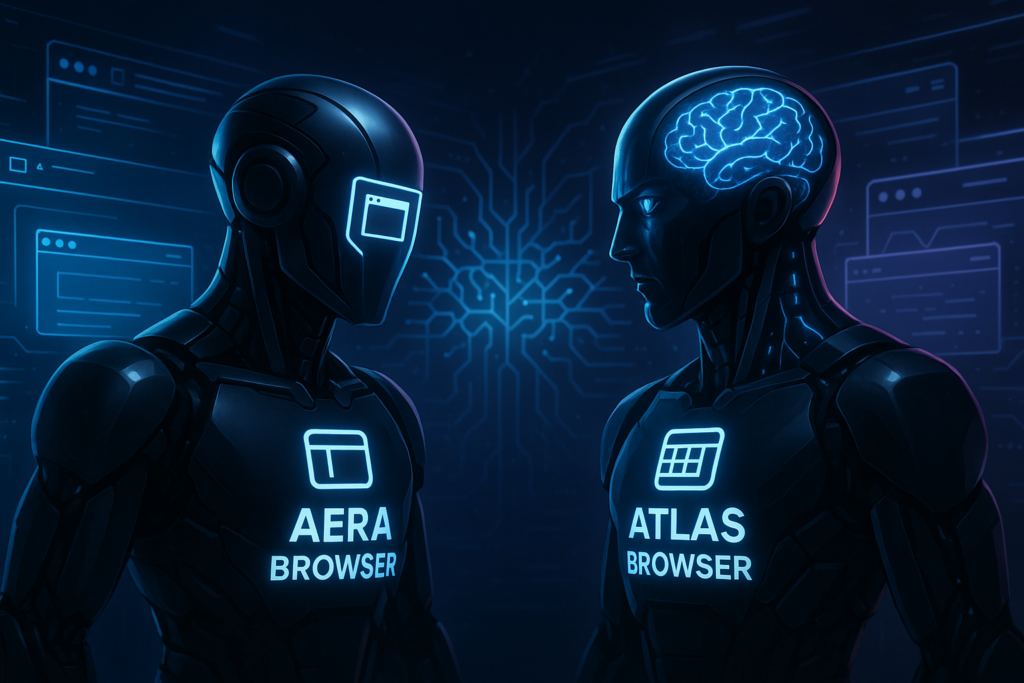Introduction: The Rise of AI Browsers
The web is evolving and 2025 marks the start of a new era in browsing. Forget simple search boxes and static tabs; the new competition is all about intelligent, autonomous browsers that think, plan, and act like agents. Two major players have emerged in this race: Aera Browser and Atlas Browser by OpenAI. Both claim to revolutionize how we interact with the web, but how do they really compare? Let’s dive into the AI browser war that’s reshaping digital exploration.
1. Understanding the New Breed of Browsers
Traditional browsers like Chrome and Edge were designed for humans to click, search, and read. AI browsers, on the other hand, are designed for agents, intelligent systems that can automate tasks, perform actions, and make decisions for users.
Aera Browser: Automation at Its Core
Aera focuses on browser automation. It’s built for developers, businesses, and power users who want to go beyond chatbots and use full-fledged AI-driven task execution. With built-in MCP (Model Context Protocol) and agent integration, Aera allows users to automate workflows like posting on social media, managing dashboards, or conducting research, all inside the browser.
Atlas Browser: OpenAI’s Assistant for the Web
Atlas is OpenAI’s upcoming AI browser, tightly integrated with ChatGPT and the GPT-5 ecosystem. It focuses on context-aware browsing, meaning it reads, summarizes, and interacts with pages intelligently. Think of it as having ChatGPT directly inside your browser, able to analyze content, compare data, and assist with searches in real time.
2. Feature Comparison: Aera vs Atlas
| Feature | Aera Browser | Atlas Browser |
|---|---|---|
| Core Focus | Browser automation and AI agents | AI-powered search and web understanding |
| Integration | Built-in MCP server and developer tools | Integrated with ChatGPT and GPT-5 models |
| Automation | Can execute actions (clicks, forms, navigation) | Can analyze and summarize but limited automation |
| Target Users | Developers, power users, enterprises | General users, researchers, AI enthusiasts |
| Performance | Fast task execution using agent workflows | Strong contextual understanding of content |
| Interface | Developer-focused, agent management UI | Familiar ChatGPT interface with browsing extension |
3. Aera’s Edge: Real Task Automation
While both browsers use AI, Aera Browser stands out for its real automation capabilities. It doesn’t just understand content it acts on it.
Aera enables users to:
- Automate posting on social media
- Scrape and structure website data
- Conduct market research autonomously
- Integrate with AI agents using MCP protocols
For developers, this means less manual coding and more intelligent delegation. Aera isn’t just your assistant, it’s your digital worker.
4. Atlas’s Advantage: Smarter Web Understanding
The Atlas Browser, built by OpenAI, leverages the power of LLMs (Large Language Models) to make browsing conversational. Instead of clicking links, you can ask, “Compare pricing for AI hosting tools”, and Atlas will intelligently browse, analyze, and present insights.
This gives Atlas a major edge in information discovery and knowledge extraction. It’s ideal for users who want to learn, analyze, and explore efficiently, without manually navigating pages.
5. The AI Browser Future: Collaboration or Competition?
While Aera and Atlas appear to compete, they represent two sides of the same revolution.
- Aera is automation-driven, an AI doer.
- Atlas is intelligence-driven, an AI thinker.
In the near future, we might see hybrid browsers that blend both strengths: understanding and action. The AI browser of tomorrow won’t just assist, it will collaborate with you on digital tasks in real time.
6. Final Verdict: Which One Wins the AI Browser War?
It depends on what you need.
- If you’re a developer or tech-savvy professional, Aera Browser gives you unmatched power through automation and control.
- If you’re a knowledge worker or researcher, Atlas Browser is your intelligent companion for context-aware browsing.
In the end, both are driving the same goal, to make
Internal Link Suggestions (for Codeblib)
- Aera Browser: The AI-Powered Revolution Changing How We Browse the Web
- Why the AI Browser Race Matters in 2025: Atlas vs Chrome vs Edge
- OpenAI’s ChatGPT Atlas Browser: How It Could Redefine Web Search in 2025
Conclusion
The AI browser war between Aera Browser and Atlas Browser is just beginning, but it signals a massive shift in how we’ll use the web. From automating workflows to intelligent content understanding, AI browsers are redefining productivity, creativity, and exploration.
Whether you side with Aera’s automation or Atlas’s intelligence, one thing is clear, the era of static browsing is over.
